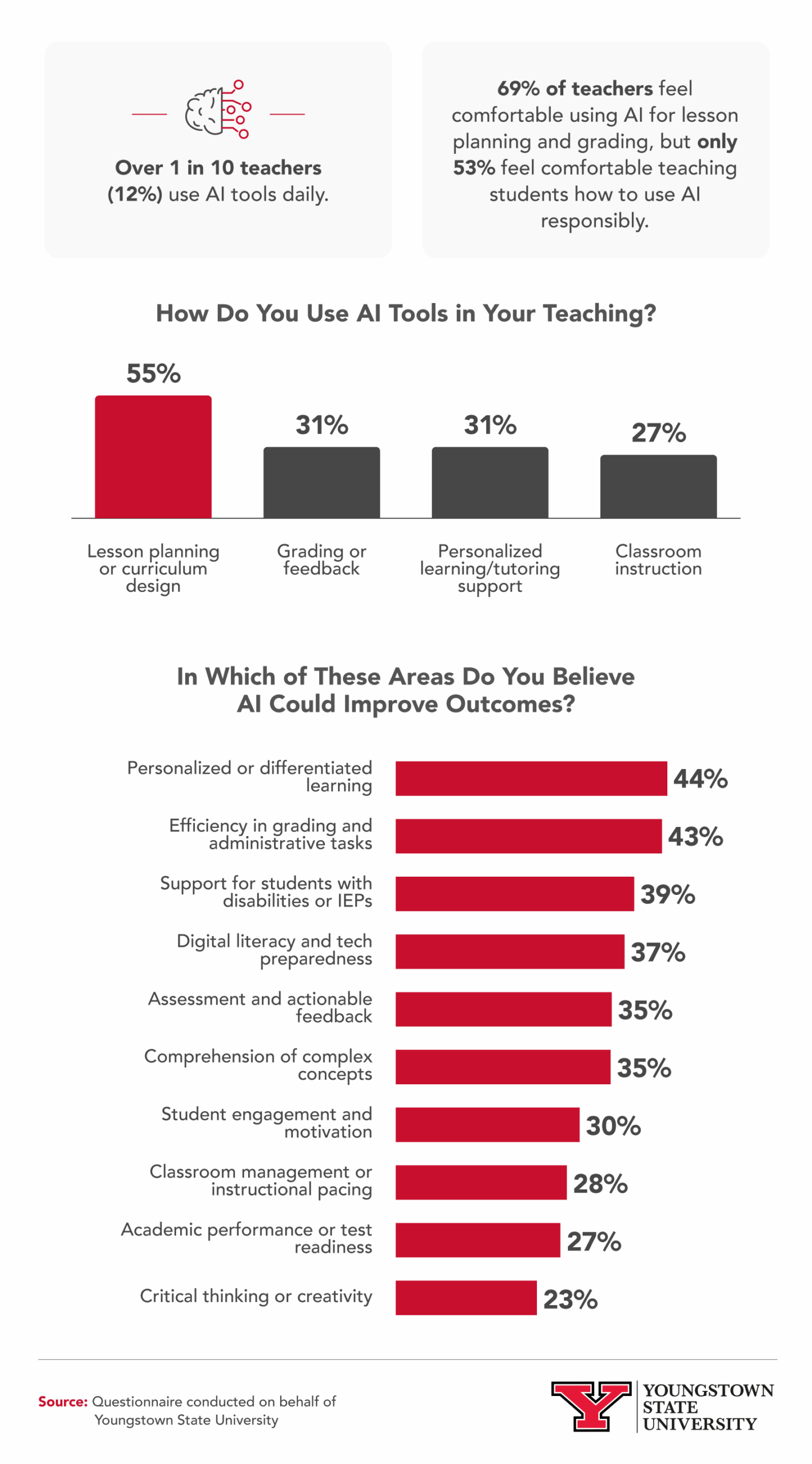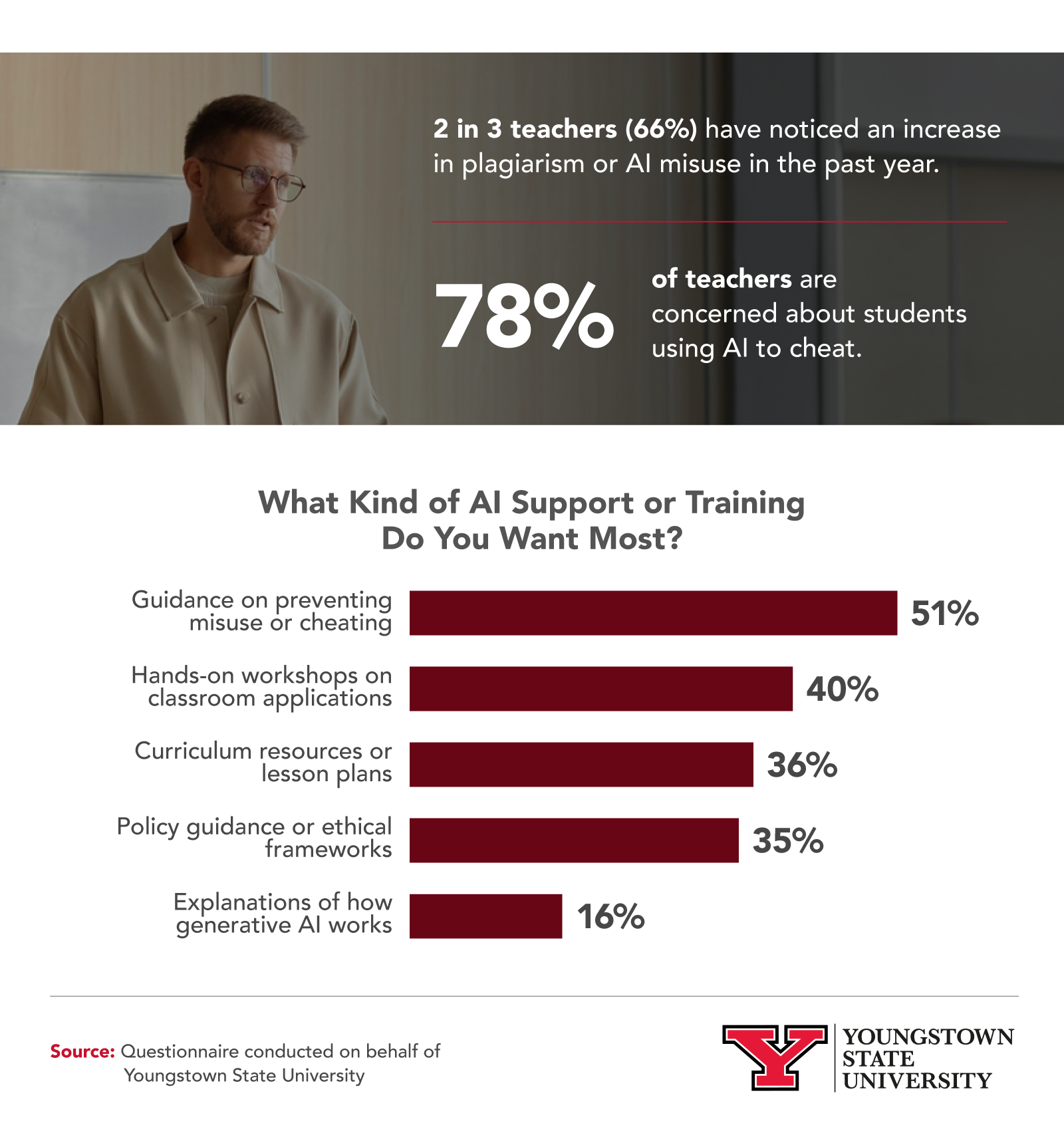
As generative AI becomes more accessible, classrooms are at a turning point. Many teachers are experimenting with tools like ChatGPT and AI-powered lesson planners, but how prepared do they feel to guide students through this shift? A new questionnaire of 336 U.S. educators reveals a surprising divide between teachers’ enthusiasm for AI and their readiness to use it confidently.
This report highlights how educators are incorporating AI into their daily routines, where they feel unsupported and why stronger training in education programs is urgently needed.
Key Takeaways
- 69% of teachers feel comfortable using AI for lesson planning and grading, but only 53% feel comfortable teaching students how to use AI responsibly.
- Over one in 10 teachers (12%) use AI tools daily.
- 52% of teachers report that AI tools reduce burnout and save time.
- One in seven teachers (15%) use ChatGPT daily.
- Two in three teachers (66%) have noticed an increase in plagiarism or AI misuse in the past year.
- One in three teachers (34%) feel significant pressure to use AI in their teaching.
Teachers Are Embracing AI, But Not Without Challenges

- 69% of teachers feel comfortable using AI for lesson planning and grading, but only 53% feel comfortable teaching students how to use AI responsibly.
- One in two teachers (52%) say AI tools have made their teaching workload easier.
- One in seven teachers (15%) use ChatGPT daily.
How Often Teachers Use AI Tools in Their Teaching Practice
- Daily: 12%
- A few times a week: 31%
- A few times a month: 24%
- Rarely: 21%
- Never: 12%
Daily AI Use Among Teachers by Grade Level
- Elementary: 7%
- Middle school: 10%
- High school: 13%
- Higher ed: 18%
AI Tools Used in the Classroom
- ChatGPT (OpenAI): 70%
- Gemini (Google): 31%
- AI writing assistants (e.g., Grammarly, QuillBot): 27%
- AI image generators (e.g., DALL·E, Midjourney): 17%
- AI grading or feedback tools: 15%
- Perplexity AI: 9%
- Claude (Anthropic): 7%
Daily ChatGPT Use Among Teachers by Grade Level
- Elementary: 9%
- Middle school: 12%
- High school: 16%
- Higher ed: 26%
Impact of AI Tools on Teacher Well-Being and Efficiency
- Burnout reduction: 52%
- Saving time: 52%
- Reducing stress: 35%
- Improving work-life balance: 34%
Many Teachers Feel Left on Their Own

- More than half of teachers (54%) say they have not received clear district-level policies on AI use in classrooms.
- Nearly two in five teachers (38%) say their school or district has provided little to no support for AI integration.
- One in three teachers (34%) feel pressure to use AI in their teaching.
- Nearly half of teachers (49%) agree that students are more prepared than teachers to use AI tools effectively.
- Nearly two in three teachers (64%) worry that AI tools could widen gaps between high- and low-resource students.
- 78% are concerned about students using AI to cheat, and two in three teachers (66%) have already noticed an increase in plagiarism or AI misuse in the past year.
- AI support or training teachers want the most:
- Guidance on preventing AI misuse or cheating: 51%
- Hands-on workshops on classroom applications: 40%
- Curriculum resources or lesson plans: 36%
- Policy guidance or ethical frameworks: 35%
- Simple explanations of how generative AI works: 16%
Teacher Perspectives on AI’s Role in Education
In the questionnaire, teachers were asked, “In your own words, how do you feel about AI’s role in education right now?” Their open-ended responses reflect a mix of optimism, caution and calls for careful oversight as AI continues to reshape classrooms.
“I think there’s a role for it, but I also think it’s being pushed too quickly without fully considering the long-term consequences for students’ critical thinking and creativity.”
— Middle school teacher, 25 years in education, age 52
“I am convinced that AI holds a promising and dynamic role in education, offering opportunities for personalized learning, efficiency and accessibility that we’ve never had before.”
— Elementary school educator, 18 years in education, age 47
“AI in education holds significant promise for customizing learning experiences and offering immediate assistance. Nonetheless, it also prompts worries about excessive dependency, data privacy issues and the necessity of interaction to foster genuine comprehension.”
— Higher education instructor, 5 years in education, age 55
“I think it has a place that we are still examining and trying to determine. But I also think we need to decrease the polarization. It’s not about replacing or cheating — it should be a conversation on what it can do and why.”
— High school teacher, 20 years in education, age 57
Methodology
This report is based on a questionnaire of 336 educators across the U.S., conducted from August 6-11, 2025. Respondents represented a range of grade levels, subjects, years of experience and geographic regions. They were asked to share their comfort levels with using and teaching generative AI, perceptions of its impact on student outcomes, experiences with district-provided training and views on preparedness to teach AI literacy.
While the findings provide valuable insight into the confidence, preparedness, and support gaps educators face in adopting generative AI, the sample size and self-reported nature of the survey limit broader generalizations. Results should be interpreted as directional, offering a timely snapshot to inform further study, policy development and professional training program design.
This is a non-scientific, exploratory questionnaire designed to explore behavioral and attitudinal trends. It is not intended to represent all teachers.
About Youngstown State University
The online graduate education programs from Youngstown State University (YSU) prepare educators for the evolving needs of today’s classrooms. With flexible coursework and forward-looking curricula, students gain the tools they need to succeed. Explore YSU’s online M.S.Ed. programs today.
Fair Use Statement
The information in this article may be used for noncommercial purposes only. If shared, provide proper attribution with a link back to Youngstown State University.


